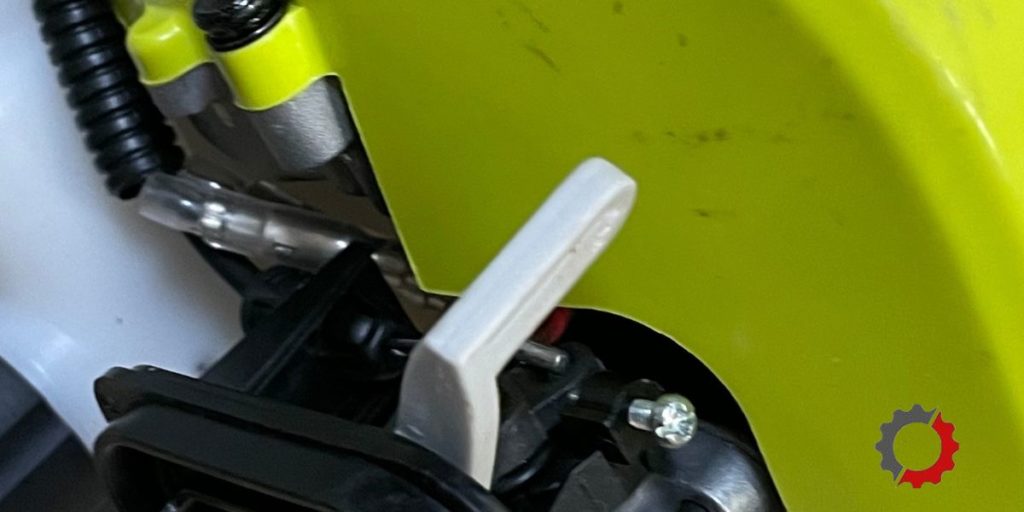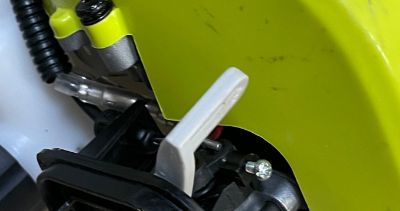Typically you move the choke lever to the off position once your string trimmer’s engine warms up. However, your Ryobi trimmer is acting up running sluggish, or dying once you remove the choke. The only way it continues to run is if the choke is still on.
A Ryobi string trimmer may only run with the choke on or at half choke when it is not getting enough fuel or it is getting too much air. This can be from running old gas, a plugged air filter, a dirty carburetor, a bad carburetor gasket, plugged fuel vent, or a hole in the fuel line.
Before performing any repairs on your Ryobi string trimmer, remove the spark plug, wait for the engine to cool, and wait for all moving parts to stop.

This post may include affiliate links. Purchases made through these links may provide a commission for us, at no extra cost to you. As an Amazon Associate, we earn from qualifying purchases.
Follow all safety instructions provided in your equipment operator’s manual prior to diagnosing, repairing, or operating.Consult a professional if you don’t have the skills, or knowledge or are not in the condition to perform the repair safely.
6 Reasons a Ryobi String Trimmer Only Runs With the Choke On
Old Gas in a Ryobi String Trimmer
Ryobi string trimmers often have problems resulting from old gas sitting in them for extended periods. Old gas will leave behind a varnish and gummy deposits that can cause your Ryobi not to run well.
Because gas can begin to break down as quickly as 30 days after you buy it, it’s important to consume fuel within this period or add a fuel stabilizer so it lasts a little longer before it breaks down.
Use the right type of gas to minimize fuel-related problems. Ryobi string trimmers use gasoline with a minimum octane rating of 89 and a maximum ethanol content of 10%.
Stay away from ethanol contents higher than this as it can cause significant damage to a small engine. Know what type of engine is on your Ryobi and fill it with the correct fuel.
- Ryobi 2-cycle string trimmer: Requires a gas and 2-cycle oil mixture at a ratio of 50:1. Some old models require a mix of 32:1. Refer to your operator’s manual.
- Ryobi 4-cycle string trimmer: Requires gas only (no oil is added).
Read more about the right fuel to use in “This is the Type of Gas and Oil Ryobi String Trimmers Use“.
Solution: Remove old gasoline from your Ryobi string trimmer. Add fresh fuel that includes an additive like Sea Foam or STA-BIL to stabilize the gas, clean the fuel system and reduce moisture.
Note: Some premium 2-cycle oils include a fuel stabilizer. These stabilizers can work anywhere from 30 days up to 2 years depending on the brand and type of oil you purchase.
Hole in the Fuel Line on a Ryobi String Trimmer
Another item that can cause you to need the choke on to keep it running is a puncture in the fuel line. When this happens, air can get sucked through the line introducing too much air.
While looking for punctures or other areas of the fuel line that aren’t secured tightly, look for fuel leaks from the fuel line.
Solution: Remove and replace any damaged, dry, or cracked fuel line.
Plugged Fuel Filter on a Ryobi String Trimmer
The filter found in the fuel tank keeps dirt and debris out of the fuel system. It can become plugged restricting the amount of fuel allowed to pass through the filter and up to the carburetor.
When the filter isn’t changed regularly in your Ryobi trimmer and becomes clogged, a sufficient amount of fuel isn’t getting to the cylinder so the choke has to be on to reduce the amount of air.
As a preventative measure, replace your fuel filter annually. If you use your Ryobi more than the average homeowner, you’ll have to replace it more frequently.
Solution: Replace a dirty fuel filter. The filter is located inside the fuel tank. First, wipe around the fuel tank cap before removing it to keep dirt from falling into the tank.
Pull the filter out of the tank using a clean bent wire. Remove the old filter and attach a new fuel filter to the end of the fuel line. Make sure you secure the ring clip to hold the fuel line to the filter.
Place the filter back inside the fuel tank. Reinstall the fuel cap.
Bad Carburetor Gasket on a Ryobi String Trimmer
The gasket that sits behind the carburetor can deteriorate and become worse over time. When this happens, it no longer seals properly allowing additional air into the system causing it to run lean.
This is when there is a higher concentration of air and less fuel than required by the Ryobi engine.
Solution: Gain access to the carburetor and carefully remove the linkages and bolts attaching the carburetor. Remove the carburetor and gasket. Reinstall a new gasket and reattach the carburetor, bolt, and linkages. You may need to clean the carburetor while it is off the string trimmer.
Dirty Carburetor on a Ryobi String Trimmer
The carburetor’s function is to regulate the amount of fuel that is mixed with air to form a combustion to start and run your Ryobi string trimmer. A buildup of varnish and deposits can make the carburetor not correctly perform this function.
Solution: If you are a little mechanical you should be able to handle cleaning your carburetor. Clean the carburetor by taking it apart and using carburetor cleaner to remove deposits left behind from old fuel.
If the carburetor does not function after being cleaned, you may need to rebuild it or replace it with a new carburetor.
Carburetors for a Ryobi string trimmer can run between $40-$70 depending on your model. Depending on the model string trimmer, the age of the unit, and the price of the carburetor, you need to decide if it’s best to invest the money into replacing the carburetor or into a new string trimmer.
You can also bring your string trimmer to a small engine repair shop to have the carburetor cleaned or replaced if you are not comfortable doing this. Note: the repair shop may just replace the carburetor instead of taking time to clean it.
This isn’t a bad thing. The amount of labor that will be charged to remove, clean, and reinstall a carburetor may be equal to or more than the cost of just replacing it with a new one.
Plugged Fuel Vent on a Ryobi String Trimmer
The fuel tank vent allows air into the tank to equalize the air pressure. Without a vent, the fuel tank will create a vacuum that won’t allow fuel to flow through the string trimmer.
A good indication you may have a fuel tank vent problem is when your string trimmer runs sluggish and then shuts down because it isn’t getting fuel. It will not start until you remove or loosen the fuel cap to allow air into the fuel tank.
Solution: Replace the fuel tank vent so the air can flow into the fuel tank. Most likely, the fuel tank vent (sometimes referred to as a check valve) is located in the cap on a Ryobi string trimmer.
